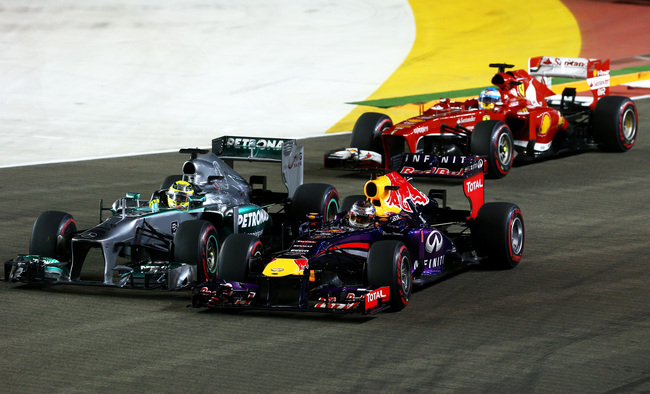Is Fernando Alonso be going to McLaren in 2015?
Is Formula One edging closer to becoming a customer car formula?
Will “works” engine teams Mercedes and Ferrari dominate next season?
These are just some of the questions and stories making their way around the internet at the moment.
With the F1 season coming to an end, the whispers inevitably develop, and the rumours start to come out, though how accurate they are is anybody’s guess.
Here is a look through the major topics stoking F1 debate at present.
Just when you thought you had heard it all, the rumours resurface with more magnitude than ever – “Fernando Alonso to return to McLaren” again…
This time, though, there’s a twist.
A Danish newspaper Ekstra Bladet has, according to GrandPrix247.com, reported that Alonso could team up with McLaren junior Kevin Magnussen (who took the Formula Renault 3.5 title last weekend) in 2015.
The credibility of this however is largely doubtful, because it looks to be based on very circumstantial facts.
Magnussen could make his Grand Prix debut next year with Marussia, which benefits from McLaren technical support. McLaren has admitted the Dane is a long-term option for the team, but was too risky to put in as a rookie.
Going further than that, GP247 also states the Bild am Sonntag newspaper as being adamant “there is more to the Alonso-to-McLaren story than mere reports”.
Again, no quotes. Circumstantial it may be, but it’s not overly farcical…is it?
ong smaller teams, chiefly whether or not they are being deliberately shut out by leading F1 figures to make way for an easy transition to a customer car formula.
According to Force, Autosport India deputy team principal Bob Fearnley believes smaller teams share a “total burden” of the costs, and the sport is well on the way to financially breaking the grid’s minnows. This, he opens, believes the door for a customer car future.
You cannot bring customer cars in unless you force teams out of business… and we are going in the right direction to do that. Am I saying that is wrong or right? That I am not sure about. But what I am sure about is that there is obviously clear evidence of a move, not only to disenfranchise teams, but to burden them with costs on a continual basis. I would assume the reason for that is to [make them] fail, which would allow the customer cars to come in.
Pastor Maldonado is adamant he will be on the F1 grid next year with Williams, despite rumours to the contrary.
There was talk at one stage of Maldonado potentially switching to Lotus, but then came suggestions that state-backed Venezuelans racers were having their funding frozen after allegations of corruption, per FOX News Latino.
The (state-owned oil company) PDVSA-backed Maldonado is not concerned, though.
He tweeted on Sunday: “I will be in F1 next season proudly representing Venezuela. Hopefully good news soon. There is a good relationship (between) team and driver, we have been working night and day to improve our performance and results.”
F1 works teams will have an advantage over their rivals when the sport introduces the new turbocharged V6 powerplants next season.
That’s according to Mercedes boss Ross Brawn, who says customer teams (including McLaren) will be disadvantaged by their lack of control and input into the new, even more complex engines.
The rules require only one engine specification, which means the likes of Mercedes and Ferrari will tailor their engine/car packages to suit one another, while customers will have to bite the bullet and get on with the engine spec that is decided upon by the manufacturer.
Of course, Renault lacks an out-and-out works team, but the world champion Red Bull outfit is near-as-dammit going to get preference over Lotus, for example.
In quotes from Germany’s Auto Motor und Sport, picked up by grandprix.com, Brawn said:
We will work together as one team at Brackley and Brixworth to get the best result from the complete car. Engine and chassis. We will help our customers as far as we can, in terms of information. But if I’m honest, they won’t have a big say. We have developed a solution for us, so the others will have to adapt.
F1 works teams will have an advantage over their rivals when the sport introduces the new turbocharged V6 powerplants next season.
That’s according to Mercedes boss Ross Brawn, who says customer teams (including McLaren) will be disadvantaged by their lack of control and input into the new, even more complex engines.
Of course, Renault lacks an out-and-out works team, but the world champion Red Bull outfit is near-as-dammit going to get preference over Lotus, for example.
In quotes from Germany’s Auto Motor und Sport, picked up by grandprix.com, Brawn said:
We will work together as one team at Brackley and Brixworth to get the best result from the complete car. Engine and chassis. We will help our customers as far as we can, in terms of information. But if I’m honest, they won’t have a big say. We have developed a solution for us, so the others will have to adapt.
